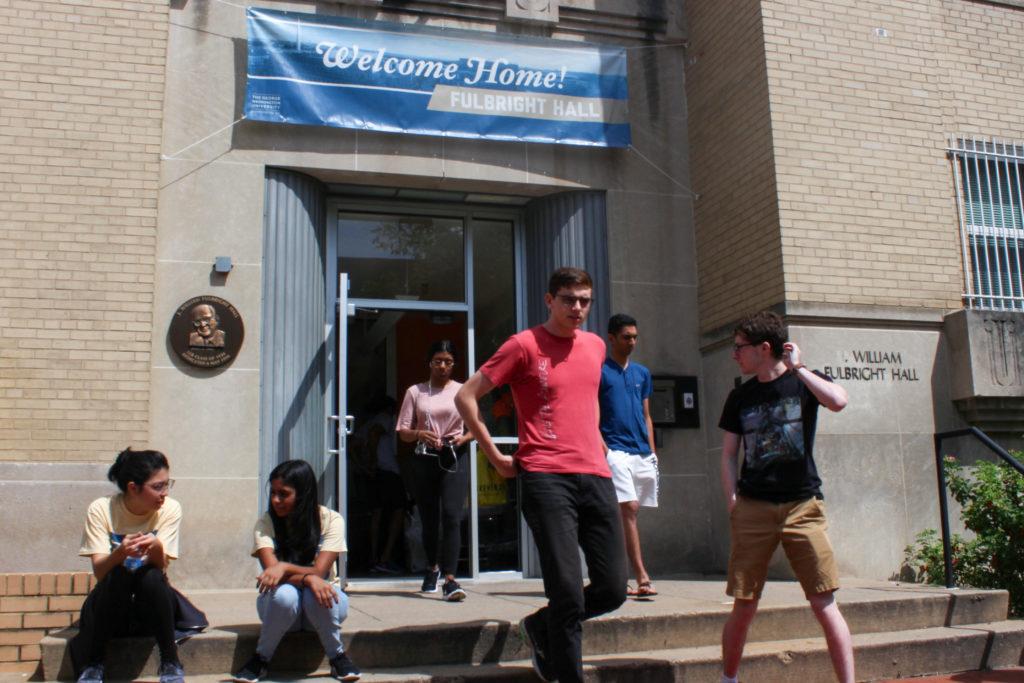As the University’s largest freshman class in at least a decade acclimates to campus, introductory courses and residence halls may seem more crowded.
At least 15 departments added class sections – and some increased course enrollment caps – to accommodate the roughly 2,800 students in the Class of 2022. Fulbright Hall will also house about 150 freshmen in quads – though the residence hall typically houses upperclassmen in triples, officials said.
Students said the new arrangements have created cramped quarters in Fulbright, while departments hired new faculty members to ensure freshmen have enough options to fulfill their core requirements this fall.
“We continue to be focused on adjusting classes and teaching assignments to accommodate the incoming class,” University spokeswoman Maralee Csellar said.
Fitting the largest class in residence halls
Seth Weinshel, the assistant dean of housing and financial services, said an additional 70 juniors were exempted from the on-campus living requirement after officials reopened the housing lottery this summer to clear beds for first-year students. Freshmen will be housed in 12 residence halls this year, including Lafayette and Fulbright halls, which have accommodated upperclassmen in the past, he said.
Weinshel said all first-year students who applied for on-campus housing were notified of their housing assignments by the first week of August. He added that the University hired another resident adviser in Fulbright to assist freshmen.
Fulbright residents said they were concerned about acclimating to small Fulbright rooms, which are typically meant to house three students but now house four freshmen each.
Nupur Savani, a sophomore resident adviser in Fulbright, said having a kitchen is a welcome addition for freshmen, but she has heard concerns about low closet and bed space compared to Thurston Hall rooms. She said officials stacked beds to make room for four students.
“They were trying to debunk it, but there’s not enough space at all for four beds to be on the floor,” she said. “That’s been a challenge for them, to have space for their desks, dressers and the beds.”
Academic departments expand class sections
Csellar, the University spokeswoman, said at least 15 departments in the Columbian College of Arts and Sciences – including fine arts, Spanish and anthropology – added sections and faculty to increase the availability of popular introductory courses.
Csellar said officials do not yet have the exact number of class sections that were added because departments may adjust courses during the first few weeks of the semester. She declined to say how many faculty members were hired to accommodate the incoming class.
CCAS added more than 70 sections across 15 departments, according to the GWeb Information System.
Daina Eglitis, an associate professor of sociology, said the department added two sections for its introductory-level classes. Introduction to Criminal Justice can now accommodate 360 students – compared to 270 last year – across four sections, while Introduction to Sociology offers spots to 165 more students than last fall, according to the GWeb Information System.
“It is a bit of an unusual semester,” Eglitis said. “We have a lot of options for freshmen this year.”
John Lill, the chair of the biology department, said the department has “significantly” expanded by adding a 96-seat lecture and four lab sections for Biology of Nutrition and Health and two extra lab sections for Introduction to Cells and Molecules.
“We have been working closely with the CCAS dean’s office to accommodate the larger class of freshmen and look forward to welcoming them,” Lill said in an email.
Lynn Offermann, the organizational sciences and communications department chair, said the department was asked to add sections to 1,000-level communication classes, like Introduction to Communication Studies and Interpersonal Communication, but couldn’t because of understaffing.
She said personal and medical issues prevented three faculty members from returning to the department this semester, hindering the department’s ability to expand course sections.
“This is a group that we normally would have called upon to take on additional sections if needed,” Offermann said.
Sarah Roach contributed reporting.





